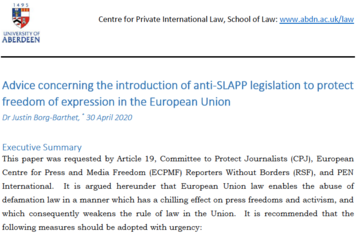
EU Member States are free to introduce substantive defamation laws and to apply different standards of protection of free speech.
However, the lack of harmonisation at the European level allows the proliferation of abuses through the application of private international law (PIL), a body of law dealing with disputes between private persons living in different jurisdictions. In particular, Brussels I Regulation (that governs the choice of jurisdiction in civil and commercial matters) and Rome II Regulation (that governs the law applicable to non-contractual obligations) are involved.
“SLAPPs (Strategic Lawsuits Against Public Participation) are abusive litigious techniques deployed against public interest reporting or activism”. The plaintiff, taking advantage of vague and elastic legal provisions, sues the defendant and uses the law as a weapon to silence criticism and suppress press freedom.
After an overview of the phenomenon and the recent and emblematic case of SLAPP that involved Daphne Caruana Galizia and Pilatus Bank, the paper provides an in-depth analysis of the rationale and legal basis for a EU intervention to protect freedom of expression and rule of law.
In particular, Prof. Borg-Barthet recommends to amend:
- the rules on jurisdiction in the Brussels I Regulation Recast, in order to remove the claimant’s unilateral right to choose a court or courts in which to pursue a claim and to establish the jurisdiction on the basis of the courts of the respondent’s domicile;
- the Rome II Regulation, as it is important to harmonise the rules on choice of law to make the applicable law more predictable and limit forum shopping.
He also argues that the EU does have competence to adopt relevant legislation concerning defamation. Further studies on national procedural and substantive laws in defamation cases should be carried out with a view to adopting a directive that will harmonise minimum safeguards for freedom of expression and will discourage vexatious lawsuits.
Rule of law monitoring mechanisms should also be put in place to evaluate the legal environment for journalism.
This policy advice has been requested by Article 19, Committee to Protect Journalists (CPJ), European Centre for Press and Media Freedom (ECPMF) Reporters Without Borders (RSF), and PEN International, and it was presented at the European Parliament in November 2019.
For more information about SLAPPs, you can read our special dossier.
Tags: SLAPP Freedom of expression Media freedomThe content of this article can be used according to the terms of Creative Commons: Attribution-NonCommercial 4.0 International (CC BY-NC 4.0) . To do so use the the wording "this article was originally published on the Resource Centre on Media Freedom in Europe" including a direct active link to the original article page.

